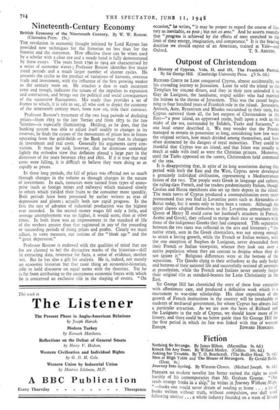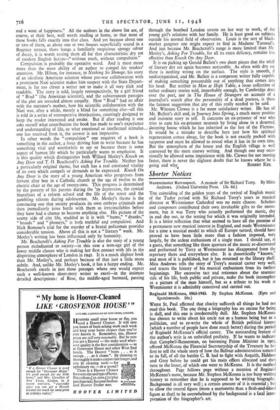FictiOn
(Dent. 9s.)
Journey Into Spring. By Winston Clewes. (Michael Joseph. 9s. 6d.) PERHAPS no modern novelist has better earned the right to speak harshly of his contemporaries than Mr. Graham Greene. " One reads strange books in a ship," he writes in Journey Without Maps, " —books one would never dream of reading at home . . . a lot of books written without truth, without compulsion, one dull word following another ... a whole industry founded on a want of leisure
and a want of happiness." All the authors in the above list are, of course, at their best, well worth reading at home, so that none of these books falls exactly into that class. And yet because about one or two of them, as about one or two houses superficially sound in a Regency terrace, there hangs a familiarly suspicious spongy odour of decay, it is worth testing them all for that characteristic dry rot of modern English fiction—" without truth, without compulsion."
Compulsion is probably the operative word. And it must mean more than the mere ability of an author to compel his readers' attention. Mr. Hilton, for instance, in Nothing So Strange, his story of an idealistic American scientist whose pre-war collaboration with a prominent Nazi scientist makes him suspect with the State Depart- ment, is far too clever a writer not to make it all very slick and readable. The story is told, largely retrospectively, by a girl friend of " Brad " (the American scientist), and the subterranean passages of the plot are revealed almost casually. How " Brad " had an affair with the narrator's mother, how his scientific collaboration with the Nazi was, after a while, merely a blind for something else—all this is told in a series of retrospective interjections, cunningly designed to keep the reader interested and awake. But if after reading it one asks oneself what contribution the book has made to one's experience and understanding of life, or what emotional or intellectual stimulus, one has received from it, the answer is not impressive.
In other words the " compulsion" one requires of a book is something in the author, a force driving him to write because he has something vital and worthwhile to say or because there is some aspect of human life which he particularly wants to emphasise. It is this quality which distinguishes both Willard Motley's Knock on Any Door and T. 0. Beachcroft's Asking For Trouble. Neither has a particularly original theme, but each has a real emotional vitality of its own which compels or demands to be expressed. Knock On Any Door is the story of a young American who progresses from fervent altar boy in a Catholic church at the age of twelve to the electric chair at the age of twenty-two. This progress is determined by the poverty of his parents during the 'z9 depression, the cynical brutalities of a reform school and the life of the street and the gambling saloons during adolescence. Mr. Motley's theme is the convincing one that society produces its own embryo criminals and then immediately joins battle with them as irreconcilables before they have had a chance to become anything else. His picture of the seamy side of city life, studded as it is with " bums," " drunks," " broads " and " phoneys," is both truthful and compulsive. And Nick Romano's trial for the murder of a brutal policeman provides considerable tension. Above all this is not a " literary " work. Mr. Motley's writing has been influenced only by humanity. Mr. Beachcroft's Asking For Trouble is also the story of a young person maladjusted to society—in this case a teen-age girl of the lower middle classes who is making her first contact with life in the dispiriting atmosphere of London in 1942. It is a much slighter book than Mr. Motley's, and perhaps because of that just a little more subtle. And, unlike Mr. Motley's book, it has a happy ending. Mr. Beachcroft excels in just those passages where one would expect such a well-known short-story writer to excel—in the intimate detailed descriptions : of Rose, the middle-aged barmaid, passing through the bombed London streets on her way to work, of the young girl's relations with her family. He is least good on subjects outside his normal field of observation. Louis is the sort of black- market gangster one might expect to find in Madame Tussaud's. And just because Mr. Beachcroft's range is more limited than Mr. Motley's, Asking For Trouble, for all its extra delicacy, remains less effective than Knock On Any Door.
It is on picking up Gerald Bullett's two short pieces that the whiff of literary dry rot again becomes noticeable. As often with dry rot there is nothing wrong on the surface. The style is smooth, if undistinguished, and Mr. Sullen is a competent writer fully capable of making something presentable out of anything that conies into his head. But neither in Men at High Table, a loose collection of rather ordinary stories told, improbably enough, by Cambridge dons over the port, nor in The House of Strangers an account of a journalist's search after the personality of a dead poetess, is there the faintest suggestion that any of this really needed to be said.
Mr. Winston Clewes is a far more satisfactory writer. He has all Mr. Bullett's skill and, in Tourney Into Spring, a much more positive and insistent story to tell. It concerns an ex-prisoner of war who tries to cure his ex-prisoner neurosis by living alone in a deserted, decaying house which he has inherited as the last of the Flettons. It would be a mistake to describe here just how his spiritual regeneration conies about, for the book is not exactly packed with suspense and must be allowed to reveal what it has in its own time. But the atmosphere of the house and the English village is well conveyed by the stern sinewy writing. And though one may occa- sionally be allowed some impatience with Mr. Clewes for not moving faster, there is never the slightest doubt that he knows where he is































 Previous page
Previous page